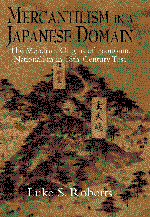Book contents
- Frontmatter
- Contents
- List of maps, tables, and figures
- Acknowledgments
- Dates and units of measurement used in the text
- Maps
- 1 Introduction
- 2 The geography and politics of seventeenth-century Tosa
- 3 Creating a crisis in Tosa, 1680–1787
- 4 The decline and restoration of domain finances
- 5 Voices of dissatisfaction and change: The petition box
- 6 Imagined economies: Merchants and samurai
- 7 Declining service
- 8 Cooking up a country: Sugar, eggs, and gunpowder, 1759–1868
- 9 Conclusion
- Glossary of terms and manuscript document titles used in the text
- Sources for figures and tables
- Works and documents cited
- Index
6 - Imagined economies: Merchants and samurai
Published online by Cambridge University Press: 17 September 2009
- Frontmatter
- Contents
- List of maps, tables, and figures
- Acknowledgments
- Dates and units of measurement used in the text
- Maps
- 1 Introduction
- 2 The geography and politics of seventeenth-century Tosa
- 3 Creating a crisis in Tosa, 1680–1787
- 4 The decline and restoration of domain finances
- 5 Voices of dissatisfaction and change: The petition box
- 6 Imagined economies: Merchants and samurai
- 7 Declining service
- 8 Cooking up a country: Sugar, eggs, and gunpowder, 1759–1868
- 9 Conclusion
- Glossary of terms and manuscript document titles used in the text
- Sources for figures and tables
- Works and documents cited
- Index
Summary
In the year of the rabbit [1759] you ordered that all people high and low should submit petitions with ideas to benefit the prosperity of the country.
Ichirōbei, head of the merchant house Umeya in Tōri-machi, first month 1764[I have seen your order] deigning to open up the paths of speech to all below, to give whatever thoughts they might have for your benefit.
Matsuo Hikotarō, [upper samurai], ninth month 1759The petitions of the petition box are a rare window into the political and economic thought of many types of people in Tosa. These petitions reveal that merchants and not samurai were the primary force behind the spread and development of kokueki thought, and that kokueki thought emerged earlier than previously has been thought. A second agenda of this chapter is to argue that kokueki was gradually adopted by the samurai rulers because it allowed them to justify limiting their devotion to the “economy of service,” articulate reasons for supporting commercial enterprise, and thereby strengthen the foundation of their rule in the face of the changes and crisis that the economy of service engendered. My purpose in this and the next chapter is to reveal the diverse class interests that led to the origins and spread of kokueki thought, and to link these to the specific historical context of the mid-eighteenth-century domainal crisis as defined in the previous chapters.
- Type
- Chapter
- Information
- Mercantilism in a Japanese DomainThe Merchant Origins of Economic Nationalism in 18th-Century Tosa, pp. 134 - 153Publisher: Cambridge University PressPrint publication year: 1998



